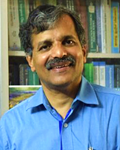| Biography | |
|---|---|
 Prof. Sabu Thomas Mahatam Gandhi University, Kottayam, Kerala, India |
|
| Title: Circular Economy: New Opportunities in Sustainable Nano Materials and Polymer Bio-Nanocomposites | |
| Abstract: Green chemistry started for the search of benign methods for the development of nanoparticles from nature and their use in the field of antibacterial, antioxidant, and antitumor applications. Bio wastes are eco-friendly starting materials to produce typical nanoparticles with well-defined chemical composition, size, and morphology. Cellulose, starch, chitin and chitosan are the most abundant biopolymers around the world. All are under the polysaccharides family in which cellulose is one of the important structural components of the primary cell wall of green plants. Cellulose nanoparticles (fibers, crystals and whiskers) can be extracted from agro waste resources such as jute, coir, bamboo, pineapple leafs, coir etc. Chitin is the second most abundant biopolymer after cellulose, it is a characteristic component of the cell walls of fungi, the exoskeletons of arthropods and nanoparticles of chitin (fibers, whiskers) can be extracted from shrimp and crab shells. Chitosan is the derivative of chitin, prepared by the removal of acetyl group from chitin (Deacetylation). Starch nanoparticles can be extracted from tapioca and potato wastes. These nanoparticles can be converted into smart and functional biomaterials by functionalization through chemical modifications (esterification, etherification, TEMPO oxidation, carboxylation and hydroxylation etc) due to presence of large amounts of hydroxyl group on the surface. The preparation of these nanoparticles includes both a series of chemical as well as mechanical treatments; crushing, grinding, alkali, bleaching and acid treatments. Transmission electron microscopy (TEM), scanning electron microscopy (SEM) and atomic force microscopy (AFM) are used to investigate the morphology of nanoscale biopolymers. Fourier transform infra-red spectroscopy (FTIR) and x-ray diffraction (XRD) are being used to study the functional group changes, crystallographic texture of nanoscale biopolymers respectively. Since large quantities of bio wastes are produced annually, further utilization of cellulose, starch and chitins as functionalized materials is very much desired. The cellulose, starch and chitin nanoparticles are currently obtained as aqueous suspensions which are used as reinforcing additives for high performance environment-friendly biodegradable polymer materials. These nanocomposites are being used as biomedical composites for drug/gene delivery, nano scaffolds in tissue engineering and cosmetic orthodontics. The reinforcing effect of these nanoparticles results from the formation of a percolating network based on hydrogen bonding forces. The incorporation of these nanoparticles in several bio-based polymers have been discussed. The role of nano particle dispersion, distribution, interfacial adhesion and orientation on the properties of the ecofriendly bio nanocomposites have been carefully evaluated. | |
| Biography: Professor Sabu Thomas is Director of the International and Interuniversity Centre for Nanoscience and Nanotechnology, Mahatam Gandhi University, Kottayam, Kerala, India. He was the former Vice Chancellor of Mahatma Gandhi University, Kottayam, Kerala, India. . Prof. Thomas is an outstanding leader with sustained international acclaims for his work in Nanoscience, Polymer Science and Engineering, Polymer Nanocomposites, Elastomers, Polymer Blends, Interpenetrating Polymer Networks, Polymer Membranes, Green Composites and Nanocomposites, Nanomedicine and Green Nanotechnology. In collaboration with India’s premier tyre company, Apollo Tyres, Professor Thomas’s group invented new high performance barrier rubber nanocomposite membranes for inner tubes and inner liners for tyres. Professor Thomas has received more than 30 national and international awards which include, FRSC, Distinguished Professorship from Jozef Stefan Institute, Slovenia, MRSI medal,CRSI medal, Distinguished Faculty Award, Dr. APJ Abdul Kalam Award for Scientific Excellence – 2016,Mahatma Gandhi University- Award for Outstanding Contribution –Nov. 2016, Lifetime Achievement Award of the Malaysian Polymer Group, Sukumar Maithy Award Faculty Research Award, Trila – Academician of The Year, European Academy of Sciences He is in the list of most productive researchers in India and holds a position of No.5. Prof. Thomas has been conferred Honoris Causa (D.Sc) by the University of South Brittany, Lorient, France, Siberian Federal University, Russia and University of Lorraine, Nancy, France, awarded Senior Fulbright Fellowship, National Education Leadership Award – 2017 for Excellence in Education. Prof Thomas also won 6th contest of "mega-grants' ' - Russian Federation. Very recently, Prof. Thomas received the coveted Kailali award from Govt of Kerala. He also received the Chancellor's Trophy for the best University of the state from the Chancellor. Very recently Prof. Thomas has been ranked by Stanford university under 2 percent top leading researchers in the world. Professor Thomas has published over 1400 peer reviewed research papers, reviews and book chapters. He has co-edited 210 books and is the inventor of 16 patents. The H index of Prof. Thomas is 136 and has more than 86,000 citations. Prof. Thomas has delivered over 350 Plenary/Inaugural and Invited lectures in national/international meetings over 30 countries. Prof. Thomas has supervised 120 PhD programmes and his students occupy leading positions in academia and industry in India and abroad. | |
